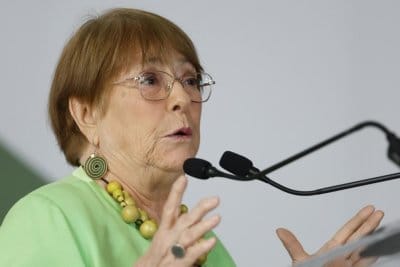
Former Chilean President Michelle Bachelet has been nominated as a candidate for U.N. secretary-general, launching her bid to lead the organization in 2027. File Photo by Sashenka Gutierrez/EPA
Sept. 26 (UPI) — Chilean President Gabriel Boric has officially nominated former President Michelle Bachelet as a candidate for U.N. secretary-general, launching her bid to lead the organization in 2027.
“Michelle Bachelet is not only a widely known and respected figure on the global stage. She is a woman whose life story is deeply consistent with the values that inspire this organization. She has served twice as Chile’s president and was, of course, the first woman to do so,” Boric said In his address Tuesday to the General Assembly,
He added that in her roles as executive director of U.N. Women and U.N. high commissioner for human rights, Bachelet “has governed, negotiated, healed and listened.” Her career allows her, in “times of fragmentation and mistrust,” to be a figure capable of building bridges.
The term of U.N. Secretary-General António Guterres of Portugal ends in December 2026. Only Bolivian Vice President David Choquehuanca has also been nominated, and Argentina’s Rafael Grossi, director of the International Atomic Energy Agency, has said he wants the position.
In July, a group of 36 former Latin American foreign ministers issued a statement stressing the urgent need to renew U.N. leadership, calling for stronger regional representation and for a woman to lead the organization.
Similarly, the former diplomats warned of “a clear gap in global representation,” noting that Latin America and the Caribbean have had only one U.N. secretary-general in eight decades — Peru’s Javier Pérez de Cuéllar, who served from 1982 to 1991 — and they called on member states “to support our region in taking on this responsibility in the next cycle.”
Several women have been mentioned as potential candidates for the U.N. leadership.
Costa Rican economist Rebeca Grynspan, 69, is secretary-general of the U.N. Conference on Trade and Development and a former vice president of Costa Rica. She is seen as a leading contender because of her long career and close ties within the U.N. system.
Mexican President Claudia Sheinbaum has endorsed biologist and diplomat Alicia Bárcena, Mexico’s environment secretary and former executive secretary of the Economic Commission for Latin America and the Caribbean.
Ecuadorian diplomat María Fernanda Espinosa has also been mentioned. She presided over the 73rd session of the U.N. General Assembly, becoming the first woman to hold that post. She has also served as foreign minister and ambassador to the United Nations.
Mia Amor Mottley, 60, is a Barbadian politician and attorney who has served as the eighth prime minister of Barbados since 2018 and as Leader of the Barbados Labour Party since 2008. Mottley is the first woman to hold either position.
“There are other very competent candidates, which is why a strong diplomatic effort and the presentation of a program for U.N. governance in difficult times will be key to standing out from the rest,” Heraldo Muñoz, former foreign minister of Chile, told UPI.
Muñoz also served as assistant secretary-general of the U.N. Development Program for Latin America and the Caribbean and as Chile’s ambassador to the United Nations.
He added that by announcing its candidate before the General Assembly, Chile “immediately positioned the former president’s bid before member states, the international press, commentators who follow world politics and civil society.”
He stressed that what comes next is hard work by Chile’s foreign ministry to deploy “its diplomatic resources to secure formal support from member states in different regions. They will have to be convinced by Michelle Bachelet’s experience in senior U.N. positions.”
Once candidates are officially nominated, the election of the next U.N. secretary-general has two stages.
All members of the Security Council must vote on a candidate. If any of the five permanent members veto the choice, that candidate is immediately out of the race. When a consensus emerges, the name is submitted to the General Assembly, which then votes to ratify or reject the appointment.
“It will be necessary to pay special attention to the 15 members of the Security Council, which proposes a name to the General Assembly. Priority work will be required with the five permanent members, who hold veto power over the candidacies,” Muñoz said.
René Jara, a political scientist and professor at the University of Santiago, said that “any alliance that can be made with other countries, particularly with the BRICS, is important.”
Jara added that the election will pit two forces against each other: those who support U.S. foreign policy and “those who will be a counterweight to those policies.” In his view, “that will be the big battle.”